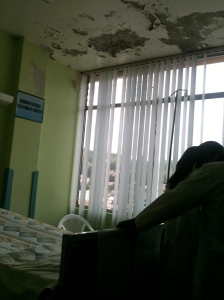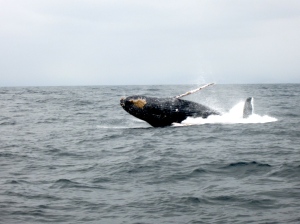 I’ve sat at my computer several times in an attempt to “wrap up” my blog, to somehow sum up my experience in a few paragraphs of text. And every time I have done so, I have stared at a blank screen with a blinking cursor while no words come. But at the gentle prodding – actually, she’s asked me at least ten times – of my grandmother, I will do my best now.
I’ve sat at my computer several times in an attempt to “wrap up” my blog, to somehow sum up my experience in a few paragraphs of text. And every time I have done so, I have stared at a blank screen with a blinking cursor while no words come. But at the gentle prodding – actually, she’s asked me at least ten times – of my grandmother, I will do my best now.
I’ve been home for three weeks now and it feels like forever. It’s fascinating how quickly you can adapt back into the old routine. So much has happened in those three weeks, though, that it has made the adjustment easier and more exciting. There are a few things that have stood out in my mind since returning home that I think are worthy of sharing…
It’s interesting when you come home and everything is entirely the same, but everything about your life is entirely changed. It was my first night home and I stood in the kitchen listening to my dad, brother and step-mom go back and forth with each other about their days and different issues at work. I stood completely silent, watching them like a tennis match, moving my head back and forth. It hit me – it’s the same here. And that isn’t a bad thing at all. But I am not the same. Ecuador and my experiences there changed my life. I did things I never thought I could do, I learned things about myself that I had never known, I made plans and goals that I may not have had the courage to make with the influence of everything and everyone at home. So now I am adjusting, fitting myself back into my old life, while working toward creating my new life.
Grocery stores are big and excessive. The first time I wandered around Safeway by myself after being home, it took me far too long to find the few things I was looking for. I roamed around like I had never been there before, like I was a foreigner in the same store I’ve been shopping at for ten years. I came home to a place that has everything, from a place that has next to nothing, at least by our standards. I don’t feel guilty, as many do after an experience like I had, for having so much or from luckily being born an American. I just feel irritated. Do we need hundreds of flavors of cereal? Does the freezer section need fourteen brands of frozen lasagna? No, we don’t need much of what we have available, but we can have it so we do. This experience opened my eyes even more to the differences in our world, and more narrowly focused my passion for international health disparities. I will most likely never take my future child to the hospital for a waterborne illness or parasite, but women I met might take their children a dozen times. And that is an unnecessary and preventable truth.
I no longer care when the telephone operator asks me to “press 1 for English.” As selfish, embarrassing and horrible as I know this sounds, this used to be a gigantic pet peeve of mine. Why on earth should I have to press 1 for English? Just talk to me in English – this is America! Other languages shouldn’t even be an option! That was shallow, naïve, pre-Ecuador Cassie. Post-Ecuador Cassie now knows what it feels like to be the minority, to be treated with prejudice at times, to be poked and prodded at for being different and standing out, to not be able to communicate on the most basic of levels. As Mark Twain said, “travel is fatal to prejudice, bigotry and narrow-mindedness.” I have a new compassion for others who may be foreign to the country I call home, who may speak a language I do not understand, because I have now been that person. And there is no right or wrong in that situation. Everyone has a home, a language they use, traditions they practice – everyone has culture. Mine has just expanded.
 “Travel is more than the seeing of sights; it is a change that goes on, deep and permanent, in the ideas of living.” (Miriam Beard) This quote sums up the thought I could not verbalize. I saw a lot of beautiful sights, tried a lot of delicious foods, met a lot of interesting people, witnessed a lot of depressing realities, and learned a lot about myself, my country and life. It’s a curious thought that just six weeks, such a seemingly insignificant amount of time, can change your perspective on living. Sure, I still love my variety of cereal flavors and never-ending freezer sections at Safeway. I am not so different from who I was on June 10th, but the August 14th Cassie thinks differently. The time I spent away showed me more of what I want out of my own life. And my hope for myself and everyone else who traveled with me, is that we won’t forget what we learned about ourselves, the goals we set and the plans we made. No one quite understands what we went through without doing it themselves. So that is my advice – get out, travel, experience, live. You’ll be amazed at what it can do for you.
“Travel is more than the seeing of sights; it is a change that goes on, deep and permanent, in the ideas of living.” (Miriam Beard) This quote sums up the thought I could not verbalize. I saw a lot of beautiful sights, tried a lot of delicious foods, met a lot of interesting people, witnessed a lot of depressing realities, and learned a lot about myself, my country and life. It’s a curious thought that just six weeks, such a seemingly insignificant amount of time, can change your perspective on living. Sure, I still love my variety of cereal flavors and never-ending freezer sections at Safeway. I am not so different from who I was on June 10th, but the August 14th Cassie thinks differently. The time I spent away showed me more of what I want out of my own life. And my hope for myself and everyone else who traveled with me, is that we won’t forget what we learned about ourselves, the goals we set and the plans we made. No one quite understands what we went through without doing it themselves. So that is my advice – get out, travel, experience, live. You’ll be amazed at what it can do for you.
And this trip has done a lot for me. It has allowed me to have now finished my education at Central Washington University (pending my receipt of that shiny and expensive piece of paper in the mail). It definitely helped in my interview process for my new full-time job at Seattle Children’s Hospital, starting next week. My life right now is exactly where I hoped it would be, and I’m honestly stunned and humbled just taking it all in. I am a college grad with a full-time job and dreams bigger than the sun. This trip opened the door, taught me more than I ever imagined, reinforced my confidence and abilities, showed me what I am capable of, and reminded me that if you want it, you can get it. So this blog cannot adequately wrap up how I feel or what I learned, but I have done my best. Three weeks out, this is how I’m feeling as I sit here on my couch, once again staring at my computer screen.
Thank you for sharing in this journey with me, for supporting me through this process. I know I couldn’t have done it without the help of many, many people. So until next time, adios.



















